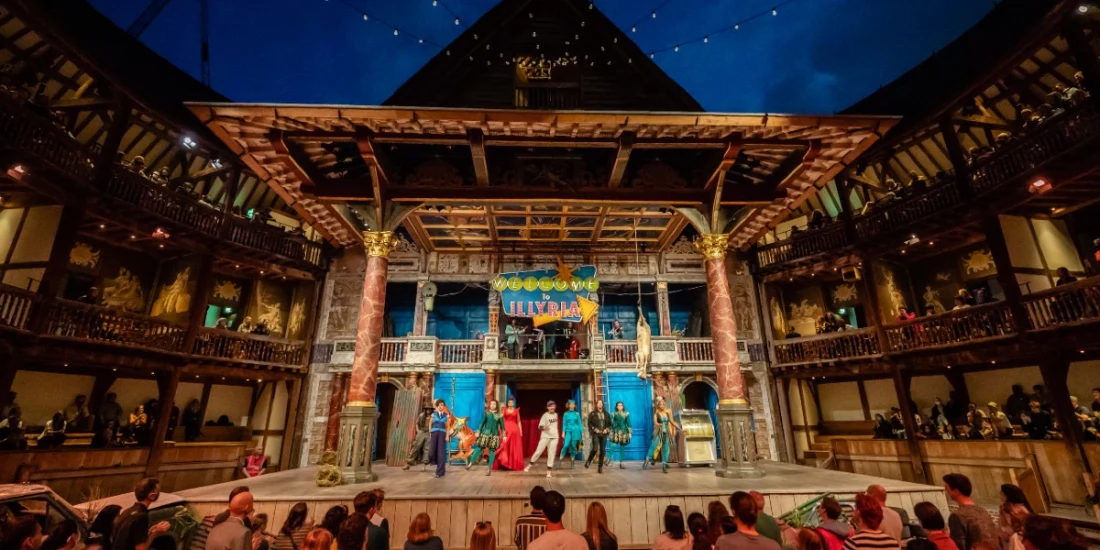A raucous ‘Twelfth Night’ at Shakespeare’s Globe struggles to balance humour with heart
Welcome to Illyria, where it's Mardi Gras every day, and the now-ramshackle town has been overrun by the Countess's vagabonds and fools. Imagine being ship-wrecked in this sin-laden land, where debauchery and jokesters seem to rule in the inconsistent-yet-jubilant production of Twelfth Night at Shakespeare's Globe.
Twelfth Night is one of Shakespeare's most popular comedies, and for those who don't remember the tale from school, the story starts with a shipwreck that separates twins Viola and Sebastian, both thinking the other dead in the disaster. Viola arrives on the shores of Illyria, where she disguises herself as a man called Cesario to work in the Duke Orsino's court. She subsequently falls for Orsino, who is love with the Countess Olivia, who then falls for Cesario. Add to that plenty of good antics from all the courtiers, and you have a recipe for Shakespearean comedy at its finest.
At the heart of Globe associate artistic director Sean Holmes's production is chaos and mismatched aesthetics. The set creates a destitute town: the lights are broken on the Vegas-styled welcome sign and colourful New Orleans-styled backdrop is boarded up with a hodge-podge of set dressing from a jukebox to a pay phone to a carousel tiger.
The costumes cover a wide range of looks too, from a vintage baseball outfit for Feste the fool to a cowboy get-up for Duke Orsino to a ball gown for Countess Olivia to a proper renaissance page boy outfit for Cesario/Viola. Perhaps inconsistency and randomness is at the heart of the concept here, as everyone seems to come exactly as they are with very little concern for others' approval.
So it stands to reason that the central plot point — Viola dressing as a man to fit in — feels slightly less believable. More roles are gender-swapped than not here, and while yes, men played all the roles in Shakespeare's day, the camaraderie displayed here appears jovial and accepting, aside, of course, from the requisite ribbing of Malvolio.
The production truly soars in the scenes between Sir Toby, Maria, Aguecheek, Feste, and Malvolio. The performers — Nadine Higgin, Nadi Kemp-Say, George Fouracres, Victoria Elliott, and Sophie Russell respectively — strike comedy gold, and their antics are heightened by the return of the groundlings, as the actors weave in between the standing audience members. Also, it must be said that Fouracres steals the entire show as Aguecheek, a sometimes thankless role.
So then, when there are more sincere scenes between Viola and the Duke or Olivia, the tone feels off. These moments are capable of just as much humour, but they are played with a pure sincerity that doesn't match the rest of the production. Viola is traditionally the "straight man" of the piece, and Michelle Terry (Globe's artistic director) plays her as such. And while her portrayal is heartfelt and moving, she doesn't seem to match the rest of the production.
For example, when Sebastian returns to Illyria and the twins reconnect, Ciarán O'Brien's Sebastian plays the entire moment for laughs, while Terry's Viola is an emotional wreck. These actors might be dressed alike and playing twins, but the moment is undermined by divergent approaches to the moment.
Overall, the production is chaotic, jubilant, and fun, which is exactly what you want from a Shakespeare comedy. (Though, bring a seat cushion because it is two and a half hours with no interval). Holmes peppers the show with contemporary music from the Four Seasons to Tina Turner to Cher, and many of the play's songs are translated into the Americana style.
Like the music, the production is a bit of a melting pot with something for everyone: romance, comedy, even a bit of violence. After all, as Feste says, "Foolery, sir, does walk about the orb like the sun; it shines everywhere."
Photo credit: Marc Brenner
Originally published on
